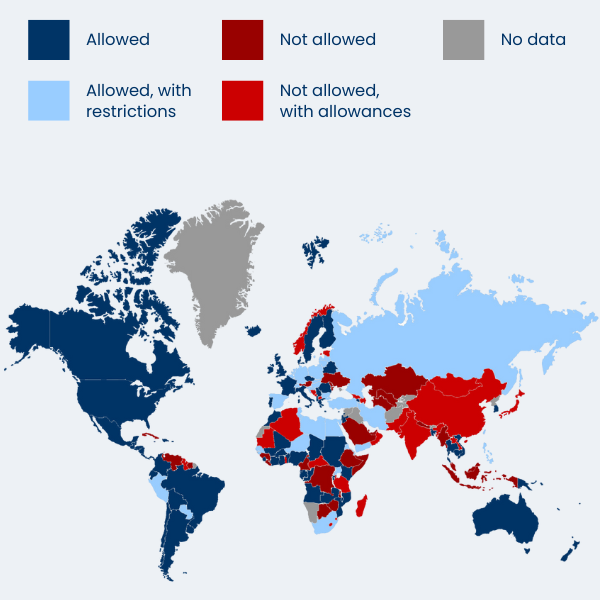Before packing, check this list of items prohibited from entering a particular country or region.
Key takeaways
- Dual citizenship (or multiple citizenship) is a legal status that simultaneously recognises individuals as citizens of two countries.
- To get dual citizenship, you must check your eligibility, gather the necessary documents, submit your application, and await the decision of your chosen country.
- Benefits of dual citizenship include freedom of movement, access to better healthcare, greater business opportunities, more political rights, and security during instability in one's home country.
- You can have three or more citizenships, depending on the laws of all countries involved.
- Countries that allow dual citizenship include the United States, Canada, the United Kingdom, Australia, France and Italy.
Dual citizenship, also known as multiple citizenship, is a legal status that recognises individuals as citizens of two countries simultaneously.
What is dual citizenship?
Dual citizenship, also known as multiple citizenship, is a legal status that recognises individuals as citizens of two countries simultaneously. It allows rights in both countries, such as residency, a passport, the ability to work, freedom of movement, and voting. However, no international convention governs such statuses, and individual countries might have conflicting laws.
Rules on dual citizenship vary between nations, with some banning it altogether. In one example, a child may acquire dual citizenship automatically through birth, even if the parents are nationals of a different country.
Other examples include:
- Naturalisation: you may become eligible for citizenship after living in a new country for a certain period, often five years or longer. However, in most instances, you must meet specific criteria, such as speaking the national language and having a clean criminal record.
- Marriage: marrying a citizen of another country could lead to citizenship. The process may involve strict requirements, including regular check-ups to prove it wasn't a marriage of convenience.
- Decent: citizenship may be granted to individuals born abroad if they have at least one parent or grandparent who is a citizen.

How to get dual citizenship?
Getting dual citizenship varies between countries, so it's crucial to understand the legal processes before applying and moving abroad. In most cases, birthright, descent, marriage, naturalisation, or investment enhances your chance of approval.
Once you know your eligibility and your current country's laws on multiple citizenships, the process will typically be as follows:
1. Gather your documentation:
Prepare by keeping all necessary documents, such as IDs, birth certificates, marriage certificates, proof of residency, and other supporting materials, in one place.
2. Complete and submit your application:
Fill in your citizenship application form accurately and in full. Double-check for errors, then submit it with all requested documents and applicable fees.
3. Attend interviews or exams:
You may need to attend face-to-face meetings, language proficiency tests or citizenship tests.
4. Receive your decision:
Once approved, you might need to take a pledge of allegiance or complete other final requirements before receiving your citizenship certificate.
5. Settle in:
Familiarise yourself with your rights and responsibilities as a new citizen, such as voting, military service obligations, income tax bands and other civic duties.

Benefits of dual citizenship
Dual citizenship offers various advantages, from increased flexibility of movement to better economic and cultural opportunities. Plus, depending on the country, you can travel visa-free to other countries. As of 2024, passport holders in France, Germany, Italy, Japan, Singapore and Spain can visit 194 nations without a visa.
Here are just some of the benefits you could enjoy by owning two or more passports:
- Freedom of movement: the ability to live, work, study and retire in another country without a visa, permit or time restrictions.
- Access to services: choose the country with the best healthcare, transport, education and other services that suit you and your family's needs. For example, some medical treatments might be cheaper in one country than another.
- Cultural connections: having more than one citizenship could offer invaluable ties to one's heritage, culture, traditions and family.
- Business opportunities: expand your network, take advantage of lower income taxes and invest in more than one country.
- Political rights: take advantage of the right to vote and participate in political activities in multiple countries.
- Security: citizenship in more than one country can provide a comforting option during political or economic instability.
How many passports can you have?
There's no limit to how many passports you can have. Instead, it's determined by each country's policies on multiple citizenships. Most nations accept the ownership of two or more passports. However, some restrict or prohibit their citizens from holding passports of other nations. In such cases, you would need to relinquish your native passport to become a citizen of a new country.
How many citizenships can you have?
The number of citizenships you can have varies from country to country. Some nations allow dual or even numerous citizenships, while others prohibit or place conditions on them.
Conditions may include:
- Renouncing your previous citizenship as a condition for acquiring new citizenship.
- Serving in the military or other national service obligations, which another citizenship does not make you exempt from.
- You may be liable to pay income tax in both countries.
- Some nations ban individuals with multiple citizenship from running for political office or being employed in government positions.
- You may be restricted from travelling to certain countries, especially if there are strained diplomatic relations.
Countries with restrictions on multiple citizenship include:
- Brazil: you can have additional citizenship with just one other country.
- Israel: multiple citizenships are allowed, but you are considered only an Israeli citizen.
- Spain: you must remain a Spanish citizen for at least three years after acquiring a new citizenship.
- Netherlands: you lose Dutch citizenship when becoming a citizen of another country unless you were born there, resided there for five years continuously before turning 18, or married one of their citizens.
- Belgium: multiples are allowed, but you are considered a Belgian citizen and must inform the authorities of your new citizenship unless it was acquired at birth.
- India: Persons of Indian Origin (PIO) who have left India may obtain a second citizenship, except in Pakistan and Bangladesh.
- United Arab Emirates: if nominated by the government or royal court, dual citizenship may be granted to foreign investors, and those deemed to have "special talents" and their families.
Countries that have outright banned multiple citizenships include Japan, Austria, China, Saudi Arabia (except Saudi women who marry foreign citizens), Singapore, Malaysia and Qatar.
Some nations allow dual or even numerous citizenships, while others prohibit or place conditions on them.

Can you have 3 citizenships?
You can have 3 citizenships or more, depending on the laws of all countries involved. Some nations, such as the UK and Canada, freely allow multiple citizenships without restrictions on rights such as voting, freedom of movement and running for political office. Other countries allow one other citizenship, and some have restrictions. In certain nations, such as Qatar and Saudi Arabia, applying for a second citizenship would result in losing your native citizenship.

What countries allow dual citizenship?
According to research by Maastricht University in 2020, an estimated 76% of countries worldwide allow dual citizenship.
Some countries explicitly encourage multiple citizenships to appease their diaspora communities, promote overseas investment and strengthen international relations.
Countries that allow multiple citizenship without limits include:
- The United States
- Canada
- The United Kingdom
- Australia
- France
- Italy
- Germany
- Sweden
- Argentina
- New Zealand
- Philippines
- South Africa (you must be granted permission by the South African government before applying)
- Ireland
- Switzerland
- Mexico
- Norway
Certain conditions or restrictions may apply even within countries that allow or promote multiple citizenship. For example, you may be able to run for political office but not the head of state: famously, Arnold Schwarzenegger became governor of California in 2003 but, as an Austrian national, could not run for president.













